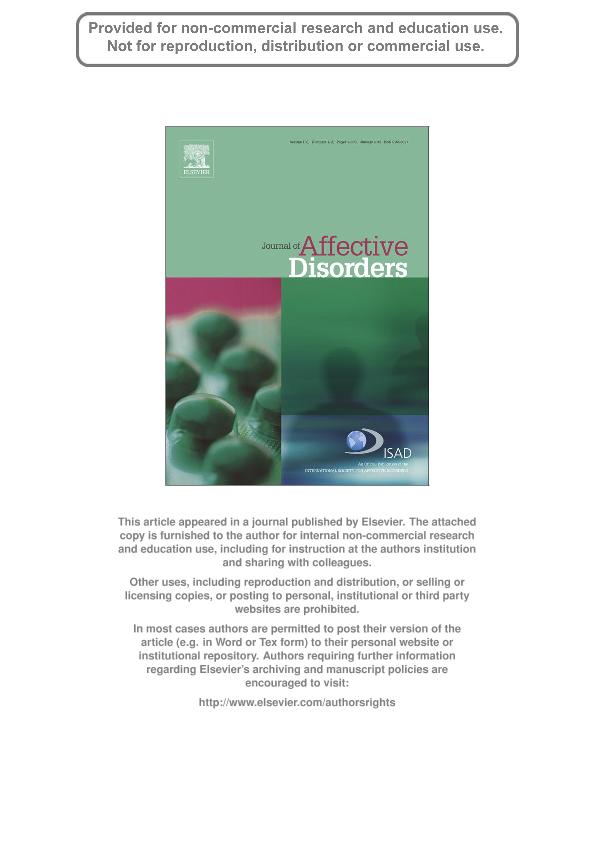Mostrar el registro sencillo del ítem
dc.contributor.author
Strejilevich, Sergio

dc.contributor.author
Samame, Cecilia

dc.contributor.author
Martino, Diego Javier

dc.date.available
2018-03-09T20:04:22Z
dc.date.issued
2015-04
dc.identifier.citation
Strejilevich, Sergio; Samame, Cecilia; Martino, Diego Javier; The trajectory of neuropsychological dysfunctions in bipolar disorders: A critical examination of a hypothesis; Elsevier Science; Journal of Affective Disorders; 175; 4-2015; 396-402
dc.identifier.issn
0165-0327
dc.identifier.uri
http://hdl.handle.net/11336/38461
dc.description.abstract
Objective The hypothesis of a progressive nature of neuropsychological deficits in bipolar disorders is often accepted as an axiom by many clinicians and researchers in the field. However, contradictory pieces of data and a number of methodological concerns put it under debate. Method We reviewed findings from three different approaches to the study of the trajectory of cognitive features in bipolar disorders: longitudinal evaluation of cognition in affected subjects, cross-sectional neuropsychological assessment of patients belonging to different age groups, and exploration of the risk of dementia in bipolar subjects. Results An increased risk of developing dementia was found in bipolar subjects. However, evidence from cross-sectional studies did not show more severe cognitive deficits in patients with longer illness duration. Furthermore, longitudinal studies revealed that bipolar subjects' cognitive performance did not change between different points in time. Conclusions After a thorough discussion of these findings and the limitations of the different approaches, we argue that, at present, there is no consistent evidence supporting that bipolar disorders, as a group, have a progressively deteriorating course of cognitive functions. Furthermore, we highlight the possible influence of psychotropic agents and metabolic factors on neuropsychological outcomes. Finally, we discuss the clinical implications of these findings and propose targets for forthcoming research.
dc.format
application/pdf
dc.language.iso
eng
dc.publisher
Elsevier Science

dc.rights
info:eu-repo/semantics/openAccess
dc.rights.uri
https://creativecommons.org/licenses/by-nc-nd/2.5/ar/
dc.subject
Bipolar Disorder
dc.subject
Cognition
dc.subject
Neuroprogression
dc.subject
Staging
dc.subject
Temporal Evolution
dc.subject.classification
Medicina Critica y de Emergencia

dc.subject.classification
Medicina Clínica

dc.subject.classification
CIENCIAS MÉDICAS Y DE LA SALUD

dc.title
The trajectory of neuropsychological dysfunctions in bipolar disorders: A critical examination of a hypothesis
dc.type
info:eu-repo/semantics/article
dc.type
info:ar-repo/semantics/artículo
dc.type
info:eu-repo/semantics/publishedVersion
dc.date.updated
2018-03-09T14:44:16Z
dc.journal.volume
175
dc.journal.pagination
396-402
dc.journal.pais
Países Bajos

dc.journal.ciudad
Amsterdam
dc.description.fil
Fil: Strejilevich, Sergio. Universidad Favaloro. Facultad de Medicina. Instituto de Neurociencias; Argentina. Consejo Nacional de Investigaciones Científicas y Técnicas. Oficina de Coordinación Administrativa Houssay. Instituto de Neurociencia Cognitiva. Fundación Favaloro. Instituto de Neurociencia Cognitiva; Argentina
dc.description.fil
Fil: Samame, Cecilia. Universidad Favaloro. Facultad de Medicina. Instituto de Neurociencias; Argentina. Consejo Nacional de Investigaciones Científicas y Técnicas; Argentina
dc.description.fil
Fil: Martino, Diego Javier. Universidad Favaloro. Facultad de Medicina. Instituto de Neurociencias; Argentina. Consejo Nacional de Investigaciones Científicas y Técnicas; Argentina
dc.journal.title
Journal of Affective Disorders

dc.relation.alternativeid
info:eu-repo/semantics/altIdentifier/doi/http://dx.doi.org/10.1016/j.jad.2015.01.018
dc.relation.alternativeid
info:eu-repo/semantics/altIdentifier/url/https://www.sciencedirect.com/science/article/pii/S0165032715000221
Archivos asociados
